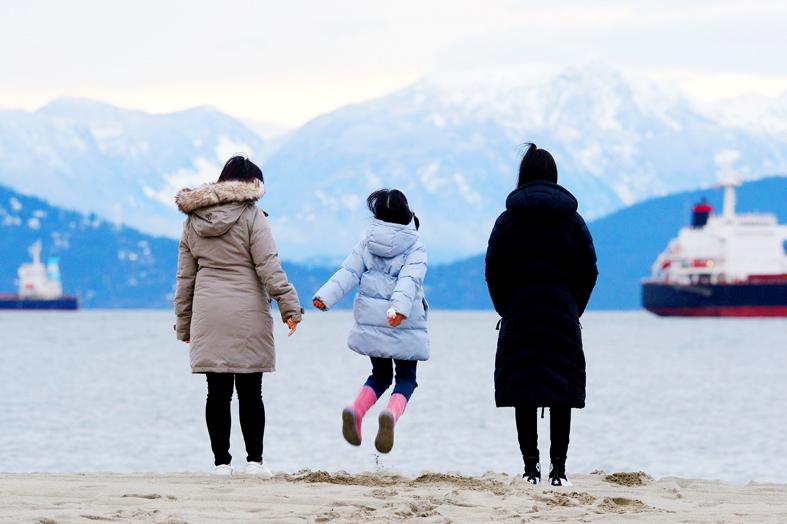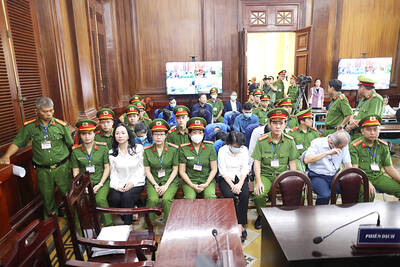A second generation of Hong Kongers is heading to Canada for refuge from political uncertainty, but unlike their parents in the 1980s and 1990s, this time seems for good. Cities such as Vancouver and Toronto are a magnet for those looking to escape as China tightens its grip on the territory of 7.5 million people.
About 300,000 already have Canadian citizenship after many families initially moved there ahead of Hong Kong’s return from British to Chinese rule in 1997.
Back then, many families separated, with one parent staying in Hong Kong for work, usually fathers who were dubbed “astronauts” as they soared through the sky on visits. Among those who went to Canada, many eventually returned, lured by the booming economy and what still seemed to be a relatively free environment.

Photo: Reuters
Things have changed.
With recent pro-democracy protests virtually snuffed out and Beijing enshrining control last year via a national security law, bags are being packed once more.
“Staying in Hong Kong is not an option anymore,” said Maria Law, 39, who moved to Vancouver last year with her two girls ahead of her husband. “I’d rather have a free future for my daughters instead of making money while they have to keep their mouths shut.”
For Law, a former flight attendant, history has repeated itself.
She is part of a rare cohort of double political emigrants.
Taken to Vancouver when she was 12, Law remembers daily speakerphone calls from the living room with her father, who was earning the family bread as a hotel chef back in Hong Kong.
Enthusiasm for the calls waned as it became clear he was staying. Yet like many such “satellite” children, separated from one or both parents, Law eventually followed in her father’s footsteps to return to Hong Kong herself for work in 2004.
“When I was young, I asked my father why I had to move. But now I am in his position, I understand,” she said. “He sacrificed more than we did. He’s the one who had to be alone.”
Thanks to Canada’s liberal immigration system, 335,646 Hong Kongers moved there between 1984 when Britain’s handover was declared and 1997, according to the Canadian International Council think tank.
It is hard to track exactly how many Hong Kongers are moving to Canada as so many can travel freely between the two.
New visa applications from Hong Kong rose more than 20 percent to 10,819 last year, Canadian immigration says.
Pre-handover immigrants created ethnic enclaves with strip malls featuring Hong Kong-style cafes, Cantonese-speaking dentists and Chinese supermarkets.
In Richmond, a Vancouver suburb, 21.9 percent of residents counted Cantonese as their first language, followed by 20 percent for Mandarin, the main language in the rest of China, in a 2016 census.
In Markham, just north of Toronto, the vast Pacific Mall shares the same name as Hong Kong’s centrally located Pacific Place shopping center.
Pacific Mall’s corridors bear the names of major arteries in Hong Kong, such as Hollywood Road or Hennessy Road.
In nearby plazas, those nostalgic for Hong Kong fare can pick up warm pineapple buns with a cold slab of butter and Chinese-language newspapers Sing Tao and Ming Pao.
Jason, who plans to move back to Canada with his wife and nine-year-old twins, said he is “a little bit confused” about his identity.
His father moved to Hong Kong during Mao Zedong’s (毛澤東) rule after four of 10 siblings starved to death in mainland China, he said.
His parents sent him to high school in Canada in 1993 at 13.
However, in 2001, his father’s construction firm was struggling and he had to drop out of college to return to Hong Kong, where he later became a furniture salesman.
Over the years he noticed Hong Kong transforming: The luxury apartments he fitted were increasingly owned by mainland Chinese, and Mandarin became the more common language.
“It’s kind of sad,” said Jason, who did not give his full name as he is yet to tell his twins about leaving. “Every time I have a gathering with friends or chit-chat with colleagues, the only topic is ‘where are you going to live’?”

Republican US lawmakers on Friday criticized US President Joe Biden’s administration after sanctioned Chinese telecoms equipment giant Huawei unveiled a laptop this week powered by an Intel artificial intelligence (AI) chip. The US placed Huawei on a trade restriction list in 2019 for contravening Iran sanctions, part of a broader effort to hobble Beijing’s technological advances. Placement on the list means the company’s suppliers have to seek a special, difficult-to-obtain license before shipping to it. One such license, issued by then-US president Donald Trump’s administration, has allowed Intel to ship central processors to Huawei for use in laptops since 2020. China hardliners

A top Vietnamese property tycoon was on Thursday sentenced to death in one of the biggest corruption cases in history, with an estimated US$27 billion in damages. A panel of three hand-picked jurors and two judges rejected all defense arguments by Truong My Lan, chair of major developer Van Thinh Phat, who was found guilty of swindling cash from Saigon Commercial Bank (SCB) over a decade. “The defendant’s actions ... eroded people’s trust in the leadership of the [Communist] Party and state,” read the verdict at the trial in Ho Chi Minh City. After the five-week trial, 85 others were also sentenced on

‘DELUSIONAL’: Targeting the families of Hamas’ leaders would not push the group to change its position or to give up its demands for Palestinians, Ismail Haniyeh said Israeli aircraft on Wednesday killed three sons of Hamas’ top political leader in the Gaza Strip, striking high-stakes targets at a time when Israel is holding delicate ceasefire negotiations with the militant group. Hamas said four of the leader’s grandchildren were also killed. Ismail Haniyeh’s sons are among the highest-profile figures to be killed in the war so far. Israel said they were Hamas operatives, and Haniyeh accused Israel of acting in “the spirit of revenge and murder.” The deaths threatened to strain the internationally mediated ceasefire talks, which appeared to gain steam in recent days even as the sides remain far

RAMPAGE: A Palestinian man was left dead after dozens of Israeli settlers searching for a missing 14-year-old boy stormed a village in the Israeli-occupied West Bank US President Joe Biden on Friday said he expected Iran to attack Israel “sooner, rather than later” and warned Tehran not to proceed. Asked by reporters about his message to Iran, Biden simply said: “Don’t,” underscoring Washington’s commitment to defend Israel. “We are devoted to the defense of Israel. We will support Israel. We will help defend Israel and Iran will not succeed,” he said. Biden said he would not divulge secure information, but said his expectation was that an attack could come “sooner, rather than later.” Israel braced on Friday for an attack by Iran or its proxies as warnings grew of